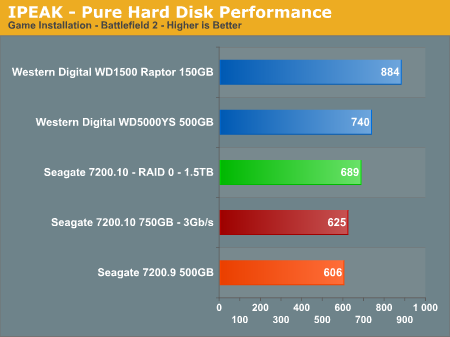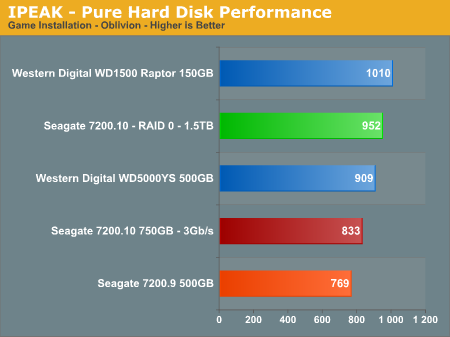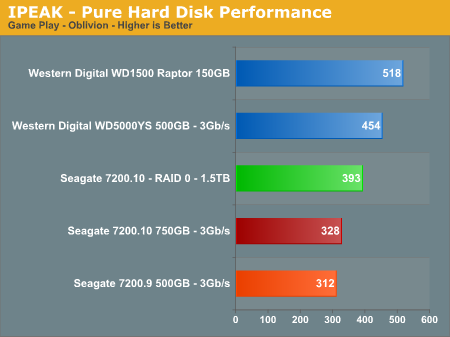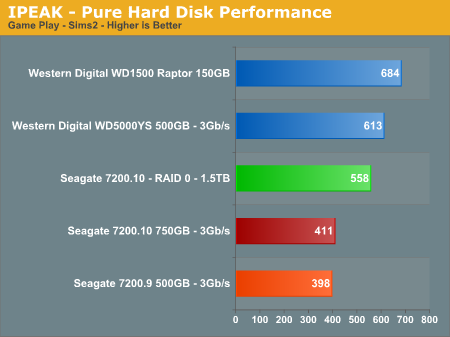Seagate Barracuda 7200.10 750GB: Size Does Matter
by Gary Key on May 18, 2006 9:00 AM EST- Posted in
- Storage
IPEAK Game Installation Tests
Our IPEAK based Game Installation benchmarks simply show the ability of the hard drive to write data as quickly as possible to the disk based upon the installation software instructions. As detailed in our IPEAK setup description, we installed the games from our source drive in order to eliminate the optical drive bottleneck. In separate application timing we witnessed basically the same percentage spread when installing the games via our DVD drive so these results are representative of actual installation performance.


We see both WD drives performing very well in these benchmarks, with the speed of the WD Raptor along with its impressive and sustainable transfer rates simply dominating the other drives in these tests. The write performance of the Seagate 7200.10 is very good in the Sims 2 benchmark as the disk utilization numbers are very consistent along with a close grouping of block sizes. The drive seems to thrive on consistent read/write requests for medium to large size blocks of information with seek distances that are close to zero.
The performance of the Seagate 7200.10 trails off in the Oblivion and Battlefield 2 benchmarks as the disk utilization numbers begin to vary along with seek distances that are no longer clustered together. Considering the platter density used in this drive, if the requests do not involve data residing on the same track, then the cache buffer will probably not be able to satisfy the request resulting in a bottleneck effect due to track-to-track seeks or poor rotational latencies. The effects of RAID 0 in these tests are minimal with performance actually suffering during our Sims 2 load test, which is a more representative result with RAID 0 in actual application usage.
IPEAK Game Play Tests
The IPEAK based Game Play tests are centered on the benefits of having a hard disk that can load non-linear and/or sequential data files quickly without interrupting the flow of the game. While the benchmark numbers indicate the performance ability of the drives within the game, these numbers will not correlate into an increase in frame rates, only an improvement in level load times, game initiation, and general responsiveness of the storage system.


The Seagate drives struggle in these benchmarks compared to the Western Digital offerings. However, we did not notice any slowdowns or stuttering during actual game play or playback of our trace recordings to analyze the drive's performance. The Seagate 7200.10 outperforms the 7200.9 by 3% in Sims 2, 5% in Oblivion, and 4% in Battlefield 2. The RAID 0 performance in Battlefield 2 was impressive from an I/O perspective while during actual game testing the load time was improved by 7%. The RAID 0 performance in our other two games showed the typical increase in I/O performance but in actual game play it was not noticeable. The WD Raptor continues it dominance against other drives in the gaming benchmarks but the WD RE2 500GB makes a strong case as high capacity gaming drive.
After an analysis of our trace files we recognized a familiar pattern with the Seagate 7200.10 as the seek distances were not clustered together resulting in the inability of the drive to keep the requests cached resulting in a bottleneck effect during track to track seeks and the resulting rotational latency. This issue compounds itself on drives with multiple high density platters. Until we are able to review the smaller capacity drives in the 7200.10 series it will be difficult to determine if the drive requires additional firmware tuning for increasingly complex localized data access patterns, improved caching algorithms, or an increase in cache size to compensate for the 41% increase in platter density.










44 Comments
View All Comments
Gary Key - Thursday, May 18, 2006 - link
The charts have been changed. :)
VooDooAddict - Thursday, May 18, 2006 - link
I like the "db(A)@5mm" sugestion.FallenDeathAngel - Thursday, May 18, 2006 - link
The RaptorWD1500ADFD Western Digital
Raptor
WD5000YS
Yes....
SpaceRanger - Thursday, May 18, 2006 - link
That the only drive you tested in RAID-0, was the new Seagate drive. The performace charts are kinda useless when the RAID-0 scores are included, cause it misleadingly shows the Seagate drive on top of a good portion of them. Without examples of RAID-0 performance from the WD1500 Raptor, or the WD5000YS, you are giving the impression of favoritism towards the Seagate drive.Gary Key - Thursday, May 18, 2006 - link
Good Day....from page 5-
We are providing RAID 0 results for the Seagate 7200.10 for comparative results to the single drive. Seagate has recently released updated firmware for the 500GB 7200.9 that improves RAID performance; unfortunately we were unable to complete our testing with the new firmware before publication. Our RAID results for the WD1500 series will be published in our next storage article.
We will have RAID O results for both of these drives in the 500GB roundup. We are not tyring to show favoritism towards the Seagate drive. Our comments are quite clear about the effects of RAID 0 in the I/O operations that while interesting, they do not always translate to actual 1:1 improvements in application usage. Our application timing tests bear this out to some degree.
We debated on showing the Seagate RAID 0 results as it is a no win situation. I am sure based upon the comments from our last couple of reviews that about as many people would be asking why we did not provide RAID 0 results. We are currently completing the RAID 0 results with the WD1500 drives, we ran into a couple of issues that required technical conversations with WD. Also, the sheer scope of testing every drive in RAID configurations is extremely time consuming with results that are basically the same when compared to the single drive scores.
My personal opinion is that RAID 0 is only effective in such a limited scope of applications that we should not report it at all. However, this feature has been pushed by the core logic chipset suppliers, marketed by the motherboard suppliers, and eventually becomes a test request by the user community. I would much rather show the benefits of RAID 5, 0+1, 10 in a separate article, which we will in the future. It is difficult at times to procure three samples of each drive. ;-)
I appreciate your comments, they will probably not be the last on this subject.
srk052004 - Thursday, May 25, 2006 - link
Hi Gary (and all). I have been told that for my purposes (manipulating 40gb SAS or SPSS data sets), RAID 0 really would be appropriate. Do you agree? Or, would you say that RAID 10 would still be preferable?I, too, would LOVE to see results comparing different capacities of 7200.10.
BTW, this was an interesting review.
SpaceRanger - Thursday, May 18, 2006 - link
Thank you for the quick response :)If you wants to show the comparision between RAID-0 and the Single drive, then have seperate charts showing just those 2. It makes the analysis of the performance much easier.
Now THAT'S an article I'd love to read as well!
Zoomer - Friday, May 26, 2006 - link
Ditto. It would be a nice way to split up articles into _more_ managable chunks of work!Thanks for the review! Will be looking forward to the ibm (hitachi), seagate and WD shootout.
Gary Key - Saturday, June 24, 2006 - link
We will change our format in July with the 500GB and 250~320GB roundups. I too would like to manage the chunks of work in different fashion.Questar - Thursday, May 18, 2006 - link
Then what was different than what Seagate claimed?